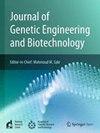针对阿尔茨海默病的胆碱能功能障碍:新一代加兰他明衍生物的开发
IF 2.8
Q3 Biochemistry, Genetics and Molecular Biology
Journal of Genetic Engineering and Biotechnology
Pub Date : 2025-07-10
DOI:10.1016/j.jgeb.2025.100530
引用次数: 0
摘要
阿尔茨海默病(AD)提出了一个重要的和未满足的医疗需求。乙酰胆碱酯酶(AChE)是AD发病机制的关键因素,引发胆碱能缺陷和随后的神经退行性进展,导致神经元丧失和认知能力下降。本研究利用计算机方法阐明了人类AChE (hAChE, PDB ID: 4EY6)与潜在的新型配体之间的结合相互作用和亲和力的结构-活性关系(SAR)。加兰他敏是治疗AD的基础胆碱能药物,可作为设计结构多样化的加兰他敏类似物的模板。通过严格的分子对接模拟和分子动力学模拟,这些类似物在调节胆碱能系统和减轻AD相关的认知功能障碍方面表现出了良好的潜力。我们的研究结果证明了计算药物设计在开发具有增强靶标选择性和潜在改善阿尔茨海默病患者治疗方案的优质加兰他明类似物方面的有效性,旨在实现卓越的认知结果和改善生活质量。本文章由计算机程序翻译,如有差异,请以英文原文为准。

Targeting cholinergic dysfunction in Alzheimer’s disease: Development of next-generation galantamine derivatives
Alzheimer’s disease (AD) presents a significant and unmet medical need. Acetylcholinesterase (AChE) enzymes are key contributors to AD pathogenesis, instigating a cholinergic deficit and subsequent neurodegenerative progression, leading to neuronal loss and cognitive decline. This study leverages in silico methods to elucidate the structure–activity relationships (SAR) governing binding interactions and affinity between human AChE (hAChE, PDB ID: 4EY6) and potential novel ligands. Galantamine, a cornerstone cholinergic therapy for AD, serves as the template for the design of structurally diverse galantamine analogs. Employing rigorous molecular docking simulations and molecular dynamics simulations, these analogs exhibit promising potential for modulating the cholinergic system and mitigating cognitive dysfunction associated with AD. Our findings demonstrate the efficacy of computational drug design in developing superior galantamine analogs with enhanced target selectivity and potentially improved therapeutic profiles for AD patients, aiming to achieve superior cognitive outcomes and improved quality of life.
求助全文
通过发布文献求助,成功后即可免费获取论文全文。
去求助
来源期刊

Journal of Genetic Engineering and Biotechnology
Biochemistry, Genetics and Molecular Biology-Biotechnology
CiteScore
5.70
自引率
5.70%
发文量
159
审稿时长
16 weeks
期刊介绍:
Journal of genetic engineering and biotechnology is devoted to rapid publication of full-length research papers that leads to significant contribution in advancing knowledge in genetic engineering and biotechnology and provide novel perspectives in this research area. JGEB includes all major themes related to genetic engineering and recombinant DNA. The area of interest of JGEB includes but not restricted to: •Plant genetics •Animal genetics •Bacterial enzymes •Agricultural Biotechnology, •Biochemistry, •Biophysics, •Bioinformatics, •Environmental Biotechnology, •Industrial Biotechnology, •Microbial biotechnology, •Medical Biotechnology, •Bioenergy, Biosafety, •Biosecurity, •Bioethics, •GMOS, •Genomic, •Proteomic JGEB accepts
 求助内容:
求助内容: 应助结果提醒方式:
应助结果提醒方式:


